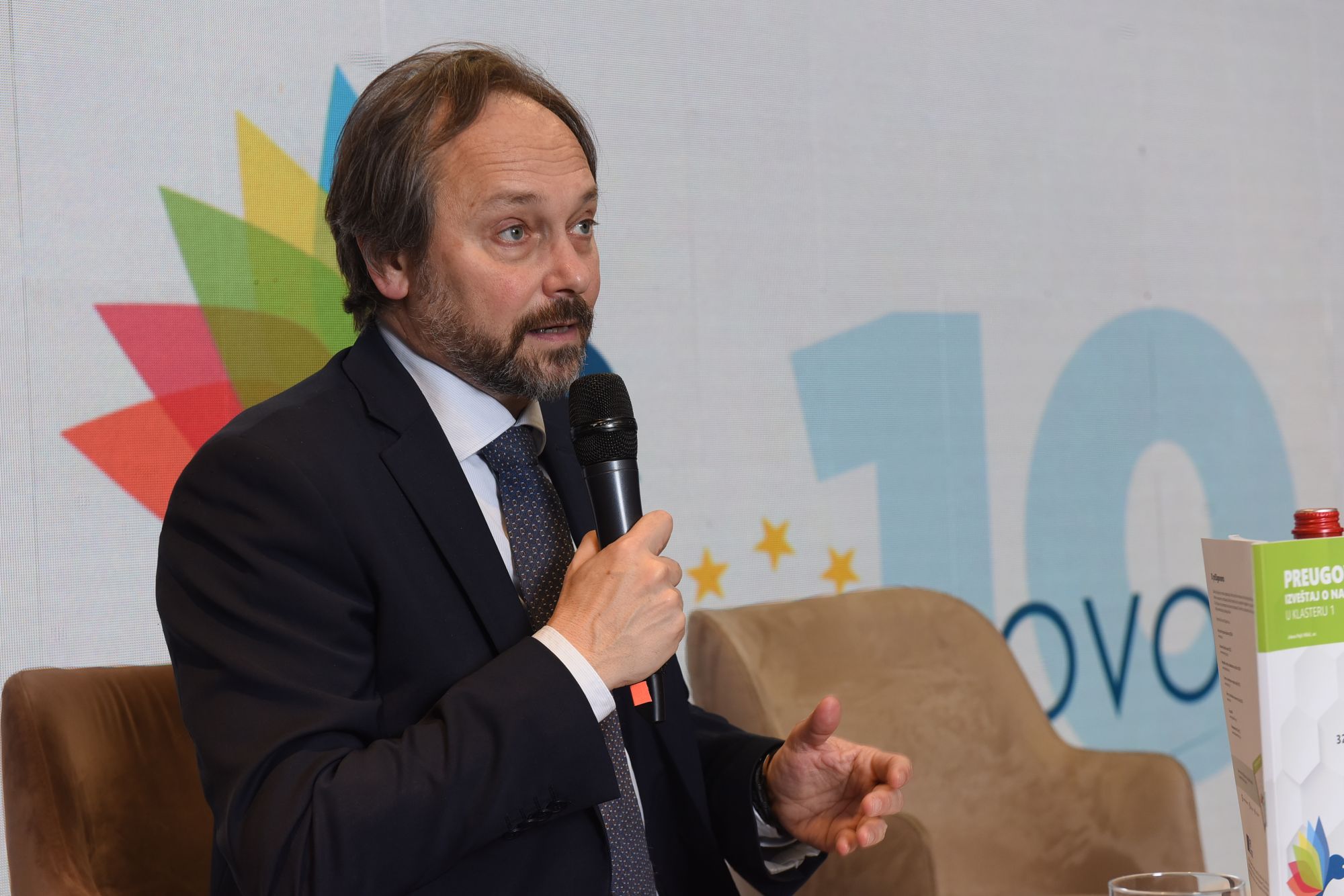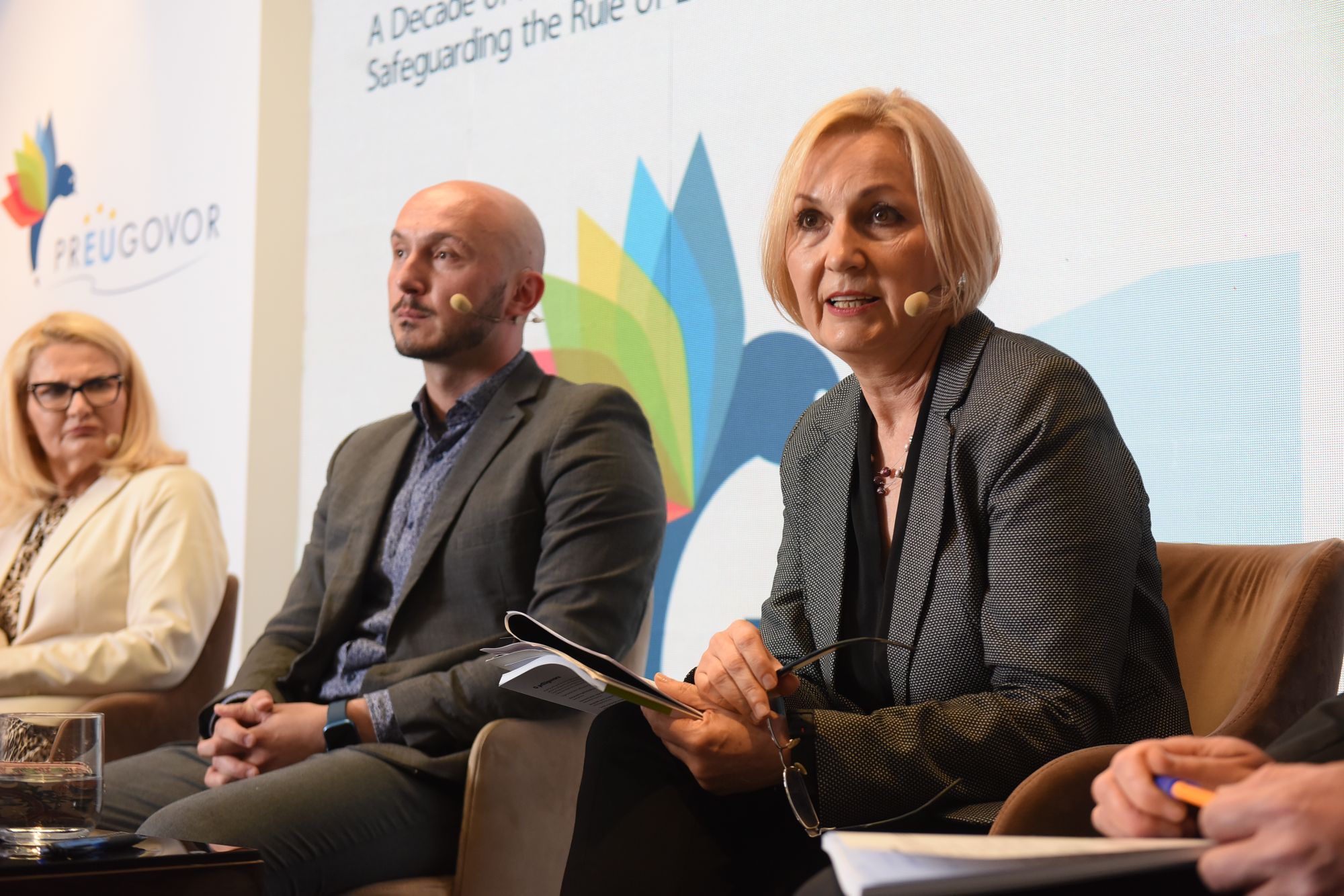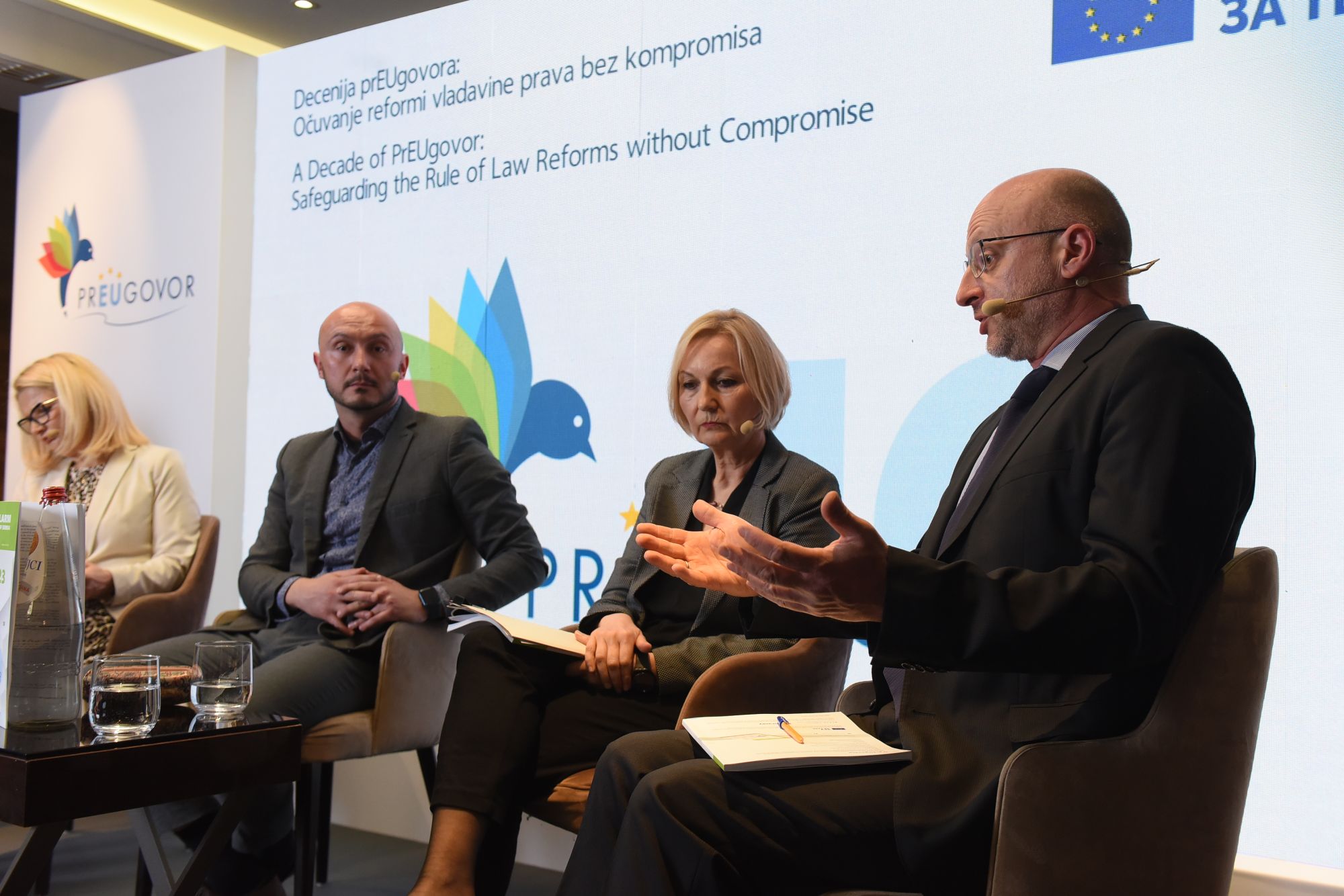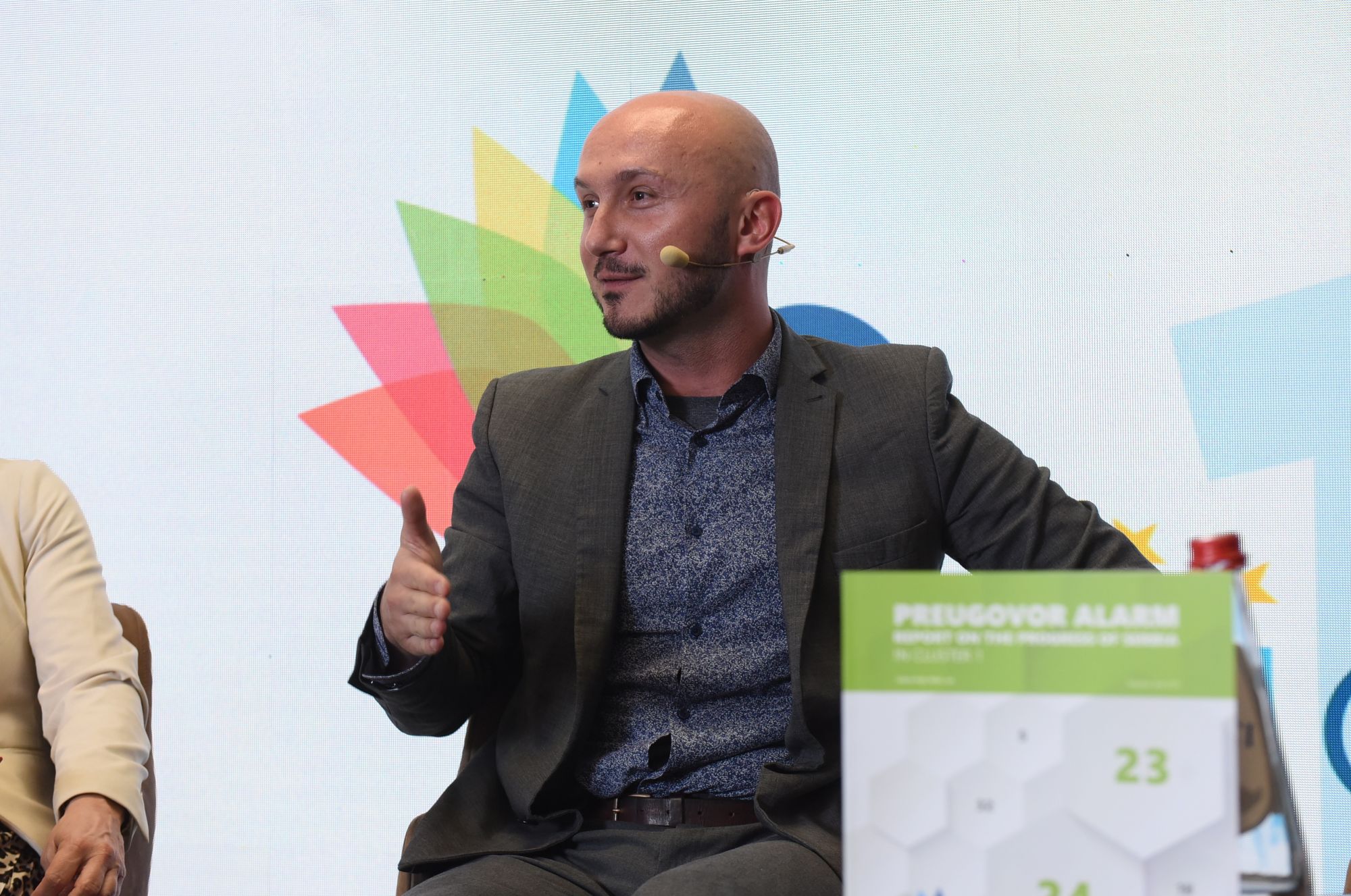The current pace of Serbia's European integration is not satisfactory. It is necessary to take advantage of the renewed attention of the European Union on the enlargement process and boldly accelerate the reforms. For this to happen, the cooperation of institutions with civil society and the restoration of mutual trust is necessary - these are the conclusions that emerged from the conference at which the prEUvogor coalition marked its decade of existence and presented the 20th prEUvovor Alarm, an independent report on the progress of Serbia in Cluster 1.
Minister for European Integration of Serbia Tanja Miščević, Nemanja Nenadić from Transparency Serbia, Tanja Ignjatović from the Autonomous Women's Centre, and Bojan Elek from the Belgrade Centre for Security Policy attended the panel discussion.
In her welcoming speech, Jelena Pejić Nikić, senior researcher at the Belgrade Centre for Security Policy and coordinator of the coalition, stated that during the six-month monitoring of the work of the new government, the focus was on the judicial reform completion and the draft law on the internal affairs. Referring to the recent tragic events in Serbia, Pejić Nikić stated that we must see them as a warning sign and continue to point out systemic problems while making suggestions for overcoming them.
Giaufret: The Rule of law remains the main pillar of European integration
The Ambassador and Head of the Delegation of the European Union to the Republic of Serbia, Emanuele Giaufret, said that now is the time for Serbia to boldly accelerate reforms, while the EU is paying much more attention to candidate countries for membership. "When there is a strong will, we can progress, even in a short period. Reforms start with changing the law, and the EU is based on the rule of law and respect for human rights."
The EU ambassador in Serbia emphasized the importance of freedom of media and expression as one of the crucial factors for joining the EU while the rule of law remains the main pillar in that process.
Cooperation between institutions and civil society is crucial, and an encouraging environment should be provided where they can secure financial resources and act without pressure, Giaufret concluded.
The unfavorable context for the enjoyment of human rights, reforms only on paper
A topic that was not the focus of reforms within the framework of European integration, and in recent days has been very relevant in Serbia, is preventing violence and protecting vulnerable groups, especially women and children. Tanja Ignjatović from the Autonomous Women's Centre spoke about the unfavorable context for the enjoyment of human rights in Serbia, with the strengthening of the right-wing, hate speech in public space, anti-gender narratives, and attacks on dissenters, citing a series of institutional failures and incidents.
She pointed out that working groups and coordination bodies are constituted late and do not work promptly. "In mid-March, the first session of the Council for Suppression of Domestic Violence was held in the new convocation, and since then, nine women had already been killed," Ignjatović pointed out.
"In those circumstances, to say that the system failed is shameless. Nothing stopped on May 3, and all the words that brought us here continued from the same places," said Ignjatović, while the members of the Autonomous Women's Centre held a banner that read "We are looking for answers," calling for answers about the treatment institution in the case of the murder of a woman in Pirot.
The work of independent bodies should not depend on political will
Nemanja Nenadić from Transparency Serbia indicates no progress in some important parts of Chapter 23, even when looking at the recommendations from the European Commission. "I would like for the fight against corruption not to require political will but to be done by independent judicial bodies," said Nenadić, assessing that one of the recommendations in the report has been partially fulfilled - the one regarding public procurement.
Nenadić also pointed to omissions in the adoption of judicial laws, which implement constitutional amendments in the field of justice, as well as in the procedure for the election of prominent lawyers that followed. While in the latter, the participation of the interested professional and general public is not ensured, in the former, the participation of that public is meaningless, and the solutions adopted leave too much discretion to the by-laws.
"It is inadmissible for the judicial councils to decide on the publicity of their work by themselves, especially if we bear in mind that the members of these councils have full immunity guaranteed by the Constitution for their opinions and votes," warned Nenadić.
Improvement of the Draft Law on Internal Affairs: A third chance?
Attempts to improve the provisions of the law on internal affairs continue through talks with representatives of The Ministry of Internal Affairs, and the two battlefronts are biometric surveillance and police management, emphasized Bojan Elek from the Belgrade Centre for Security Policy. He also pointed to the recent establishment of the High School of Internal Affairs without a legal basis.
Instead of having the rule of law, this country is run by those above the law. Those who have the power can achieve anything by simply changing the law, concluded Elek.
As a specific recommendation for the Government of Serbia, Elek singled out the need to announce a competition for the election of police director as soon as possible, a position that has been vacant since the end of 2021, the importance of which has been particularly emphasized recently.
Miščević: There is no European integration without the participation of all citizens
Minister for European Integration, Tanja Miščević, stated that civil society is an important part of the integration process, with a reminder that it should be critical yet objective. "Our main task is dialogue because it is not a good starting point if civil society does not participate in the processes because it does not trust the institutions," she emphasized, adding that "there is no EU integration process if all citizens do not participate in it."
"The judicial reform is not a law; it is not even the adoption of constitutional amendments nor laws and by-laws. It means a change of consciousness, professionalization, and building the integrity and activities of all those participating in that process. I do not say that we have to wait for centuries, I'm not even looking for justification in that, but I would like us all to participate in it together," Miščević points out.
You can watch the conference "A Decade of PrEUgovor: Safeguarding the Rule of Law Reforms without Compromise" here.






